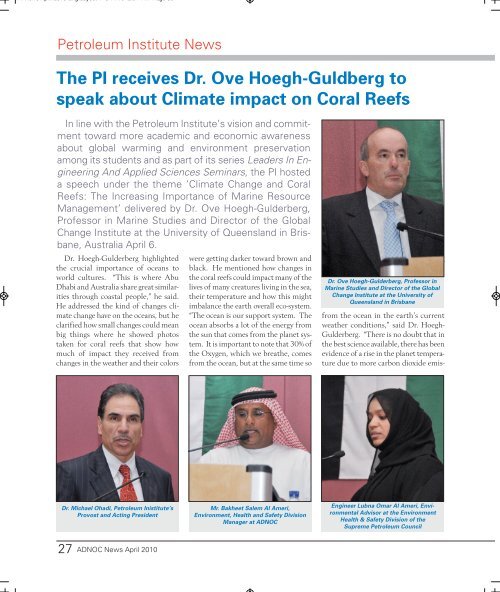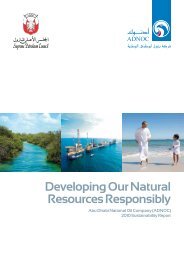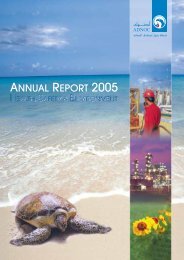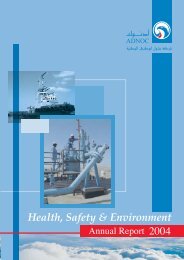You also want an ePaper? Increase the reach of your titles
YUMPU automatically turns print PDFs into web optimized ePapers that Google loves.
A. <strong>News</strong> <strong>April</strong> <strong>2010</strong> <strong>Eng</strong>:<strong>Layout</strong> 1 5/11/10 2:04 PM Page 30<br />
Petroleum Institute <strong>News</strong><br />
The PI receives Dr. Ove Hoegh-Guldberg to<br />
speak about Climate impact on Coral Reefs<br />
In line with the Petroleum Institute’s vision and commitment<br />
toward more academic and economic awareness<br />
about global warming and environment preservation<br />
among its students and as part of its series Leaders In <strong>Eng</strong>ineering<br />
And Applied Sciences Seminars, the PI hosted<br />
a speech under the theme ‘Climate Change and Coral<br />
Reefs: The Increasing Importance of Marine Resource<br />
Management’ delivered by Dr. Ove Hoegh-Gulderberg,<br />
Professor in Marine Studies and Director of the Global<br />
Change Institute at the University of Queensland in Brisbane,<br />
Australia <strong>April</strong> 6.<br />
Dr. Hoegh-Gulderberg highlighted<br />
the crucial importance of oceans to<br />
world cultures. “This is where Abu<br />
Dhabi and Australia share great similarities<br />
through coastal people,” he said.<br />
He addressed the kind of changes climate<br />
change have on the oceans, but he<br />
clarified how small changes could mean<br />
big things where he showed photos<br />
taken for coral reefs that show how<br />
much of impact they received from<br />
changes in the weather and their colors<br />
Dr. Michael Ohadi, Petroleum Inistitute’s<br />
Provost and Acting President<br />
27<br />
ADNOC <strong>News</strong> <strong>April</strong> <strong>2010</strong><br />
were getting darker toward brown and<br />
black. He mentioned how changes in<br />
the coral reefs could impact many of the<br />
lives of many creatures living in the sea,<br />
their temperature and how this might<br />
imbalance the earth overall eco-system.<br />
“The ocean is our support system. The<br />
ocean absorbs a lot of the energy from<br />
the sun that comes from the planet system.<br />
It is important to note that 30% of<br />
the Oxygen, which we breathe, comes<br />
from the ocean, but at the same time so<br />
Mr. Bakheet Salem Al Ameri,<br />
Environment, Health and Safety Division<br />
Manager at ADNOC<br />
30 to 40% of carbon dioxide is coming<br />
Dr. Ove Hoegh-Gulderberg, Professor in<br />
Marine Studies and Director of the Global<br />
Change Institute at the University of<br />
Queensland in Brisbane<br />
from the ocean in the earth’s current<br />
weather conditions,” said Dr. Hoegh-<br />
Gulderberg. “There is no doubt that in<br />
the best science available, there has been<br />
evidence of a rise in the planet temperature<br />
due to more carbon dioxide emis-<br />
<strong>Eng</strong>ineer Lubna Omar Al Ameri, Environmental<br />
Advisor at the Environment<br />
Health & Safety Division of the<br />
Supreme Petroleum Council









